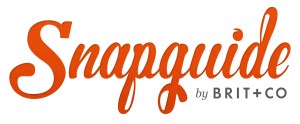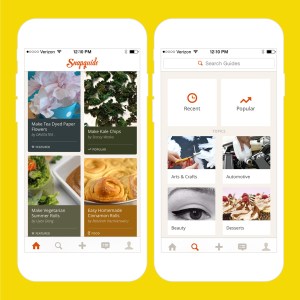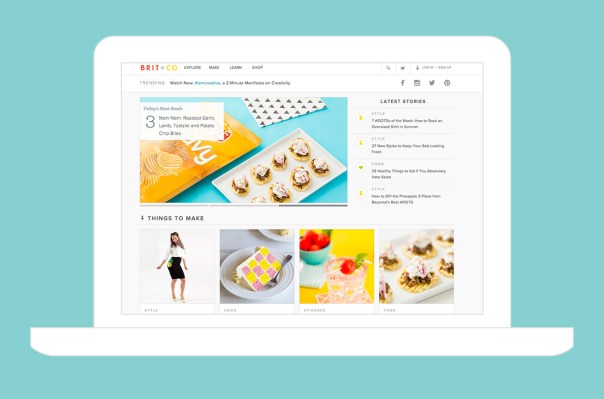Big news today for Brit + Co., the lifestyle media and e-commerce business aimed at people interested in crafty projects. The startup has confirmed that it’s raised $20 million in funding, and it has acquired user-generated DIY app Snapguide to add more media to its platform — or, as CEO and founder Brit Morin told TechCrunch, “to build out our community with more content.”
 The terms of the Snapguide deal — which is Brit + Co’s first acquisition — have not been disclosed but we understand it is an asset sale, covering the company’s website and app (now renamed “Snapguide by Brit + Co”), its network of users, its trove of DIY guides numbering 100,000, and the technology platform to create more. Only one employee is coming over with the deal, Snapguide’s community manager.
The terms of the Snapguide deal — which is Brit + Co’s first acquisition — have not been disclosed but we understand it is an asset sale, covering the company’s website and app (now renamed “Snapguide by Brit + Co”), its network of users, its trove of DIY guides numbering 100,000, and the technology platform to create more. Only one employee is coming over with the deal, Snapguide’s community manager.
Brit + Co says it now has 12 million monthly unique users, growing threefold year-over-year. That number includes not just visitors to the main Brit + Co site but also social followers. Indeed, the brand has become something of a buzzy and credible fixture on social sites that share similar demographics around the coveted, tech-friendly, 20-30-something female demographic. Morin says that its Pinterest posts are on average repinned 50,000 times daily.
Brit + Co has come into its own amid a bigger trend around homemade, locally and responsibly sourced products and the wider rise of the “maker movement” — where people are tapping into technology to build, cook, sew and generally spend just as much if not more time creating things as just simply consuming them.
“There is a cultural shift happening today,” Morin says. “People want handmade things, they sometimes want to make things themselves, and they want to leverage technology to do it. We are trying to straddle both sides of that world — technology and the maker movement. We’re following all the trends in areas like 3D printing, for example, and we are really good at making that accessible to a mainstream audience.”
She says that this is different from the more open-ended nature of something like YouTube or of Etsy. She calls the latter a very “democratic” site for selling goods. “We are like the magazine version, very curated, where we choose all the makers and content.” Morin thinks of her site more as “Houzz for DIY.” I think of Brit + Co as a slightly younger, more fashionable Martha Stewart rival — fitting considering that Susan Lyne, the former CEO both of Martha Stewart and Gilt Groupe, is now joining Brit + Co’s board of directors.
Morin credits her own interest in DIY as the initial spark for Brit + Co. A former Googler, she’d thought about founding a health startup, but after making her own wedding invites (she’s married to investor and Path co-founder Dave Morin), she realised she could put her own interests and passions to work.
E-Commerce And Native Content
The fundraising being confirmed today was first made public in an SEC filing in May, which noted that Brit Media raised $23 million. Now we have more of the actual details.
The round was led by Intel Capital, with participation also from UK media group DMGT (the UK media group that owns both the Daily Mail and Elite Daily), Liberty Media, Oak Capital and angels including Jim Fielding, who has a long track record as an exec both in retail and entertainment. (The extra $3 million noted on the Form D, incidentally, was a bridge loan from last autumn.)
This latest round brings the total funding raised by Brit Media (as the main company is called) to $27.5 million. In line with the growing financial expansion, it is also naming Nicole Emanuel in the new role of CFO. She comes from SwarmMobile, and before that was the CFO of Refinery29.
The Series B funding will be used in part to invest in developing the revenue-generating parts of the business, Morin tells me, effectively building out ways for both Brit + Co. and its audience to make more money.
“Our core mission is to inspire our community to be more creative, and we saw that we could also help them make a living,” she says.
This will take a couple of forms. Since announcing an Etsy-style marketplace about a year ago for people to sell hand-made products through the site, Brit + Co has been growing its e-learning business, and has now sold 15,000 classes and kits and is seeing “a lot of traction”.
The e-learning fuels commerce on two levels: first, people are paying to take the classes themselves; and second, Brit + Co is bundling and selling supply kits to accompany these classes — for example, a calligraphy set to use with an online calligraphy tutorial.
While today Brit + Co. is making the majority of its sales from advertising on the site, Morin says that the classes and kits are growing much faster and she expects revenues from them to surpass ad sales by next year, although the company is not disclosing any revenues at the moment.
Interestingly, Brit + Co appears to be developing its own native content strategy, too. Morin says it is working on better ways of matching up its maker community with businesses, where creators will work with a specific product or brand to develop a story or video (or in the case of Snapguide, perhaps a how-to slideshow). In turn, Brit + Co will take a revenue share if it can help a maker get a content sponsorship. (This format will sound familiar to those of you who read food or craft blogs, where many independent bloggers already tie up with brands in this way.)
As part of this funding round, Lisa Lambert, managing director and vice president of Intel Capital, is joining the board along with Lyne. Additionally, there will be a new subcommittee on the board with Daily Mail North America CEO Jon Steinberg, former Apple exec Ron Johnson and Fielding.
“Brit Morin has earned a position as one of the most forwardthinking entrepreneurs of her generation,” said Lambert in a statement. “With its powerful combination of media and ecommerce, Brit + Co is bringing more women and girls into the fastgrowing maker movement, which fits perfectly into the goals of our new Diversity Fund.”
 As for Snapguide, it’s not entirely clear why the startup decided to sell. After a promising start in 2012, it seems it didn’t manage to grow as fast as its founders — Yahoo alum Daniel Raffel and Google alum Steve Krulewitz — had hoped it would. Snapguide had raised $10 million from investors including Crunchfund (TC founder Michael Arrington’s VC fund), Index Ventures, Slow Ventures (Morin’s husband’s firm), SV Angel and Atlas.
As for Snapguide, it’s not entirely clear why the startup decided to sell. After a promising start in 2012, it seems it didn’t manage to grow as fast as its founders — Yahoo alum Daniel Raffel and Google alum Steve Krulewitz — had hoped it would. Snapguide had raised $10 million from investors including Crunchfund (TC founder Michael Arrington’s VC fund), Index Ventures, Slow Ventures (Morin’s husband’s firm), SV Angel and Atlas.
Snapguide also had its share of M&A rumors. In fact, we’d actually been tipped that it also had an offer from Google just prior to Brit + Co. Whatever happened there, at least now the least the tech and product will live on.
